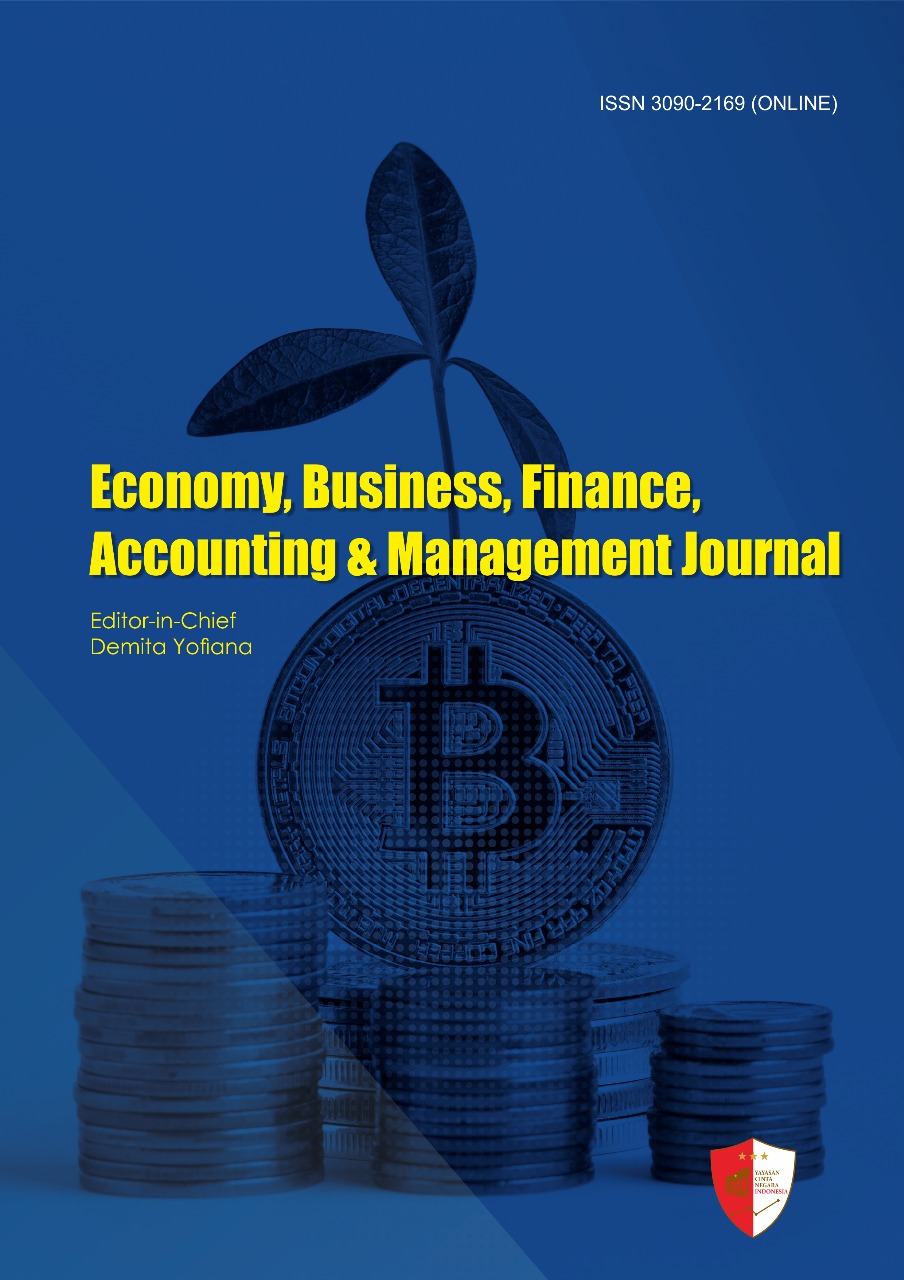Analysis of the influence of motivation and work environment on employee productivity
Keywords:
Employee Productivity, Motivation, Organizational Performance, Quantitative Analysis, Work EnvironmentAbstract
This study analyzes the influence of motivation and work environment on employee productivity, aiming to provide empirical evidence on how these two factors contribute to optimal organizational performance. Employee productivity is a critical determinant of business competitiveness, particularly in dynamic and competitive markets. Motivation, both intrinsic and extrinsic, drives employees to perform tasks effectively, while a conducive work environment encompassing physical conditions, organizational culture, and interpersonal relationships supports consistent performance. The research employs a quantitative approach using a survey method. Data were collected from 150 employees across various departments in a medium-sized manufacturing company through structured questionnaires. Motivation was measured using indicators of intrinsic satisfaction and extrinsic rewards, while the work environment was assessed through physical comfort, workplace safety, and social interaction quality. Employee productivity was measured based on self-reported output, efficiency, and goal attainment. Multiple regression analysis was applied to test the hypotheses. The results reveal that both motivation and work environment have significant positive effects on employee productivity. Motivation demonstrates a slightly stronger influence, indicating that psychological and reward-based drivers play a key role in enhancing performance. However, the work environment also contributes meaningfully, emphasizing the importance of providing safe, comfortable, and socially supportive conditions. These findings suggest that organizations should integrate motivational strategies with workplace improvements to achieve sustainable productivity growth
References
Agyeman, C. M., & Ponniah, V. M. (2014). Employee demographic characteristics and their effects on turnover and retention in SMEs. International Journal of Business and Management, 9(12), 173–185.Akintayo, D. I. (2010). Work-family role conflict and organizational commitment among industrial workers in Nigeria. Journal of Psychology and Counseling, 2(1), 1–8.
Al-Omari, K., & Okasheh, H. (2017). The influence of work environment on job performance: A case study of engineering company in Jordan. International Journal of Applied Engineering Research, 12(24), 15544–15550.
Amabile, T. M., & Kramer, S. J. (2011). The progress principle: Using small wins to ignite joy, engagement, and creativity at work. Harvard Business Review Press.
Armstrong, M., & Taylor, S. (2020). Armstrong’s handbook of human resource management practice (15th ed.). Kogan Page.
Bakker, A. B., & Demerouti, E. (2007). The Job Demands–Resources model: State of the art. Journal of Managerial Psychology, 22(3), 309–328.
Chandrasekar, K. (2011). Workplace environment and its impact on organisational performance in public sector organisations. International Journal of Enterprise Computing and Business Systems, 1(1), 1–19.
Deci, E. L., & Ryan, R. M. (1985). Intrinsic motivation and self-determination in human behavior. Springer.
Gagné, M., & Deci, E. L. (2005). Self‐determination theory and work motivation. Journal of Organizational Behavior, 26(4), 331–362.
George, J. M., & Jones, G. R. (2012). Understanding and managing organizational behavior (6th ed.). Pearson.
Hackman, J. R., & Oldham, G. R. (1976). Motivation through the design of work: Test of a theory. Organizational Behavior and Human Performance, 16(2), 250–279.
Haynes, B. P. (2008). The impact of office comfort on productivity. Journal of Facilities Management, 6(1), 37–51. https://doi.org/10.1108/14725960810847459
Herzberg, F., Mausner, B., & Snyderman, B. B. (1959). The motivation to work (2nd ed.). John Wiley & Sons.
Judge, T. A., & Bono, J. E. (2001). Relationship of core self‐evaluations traits self‐esteem, generalised self‐efficacy, locus of control, and emotional stability with job satisfaction and job performance: A meta‐analysis. Journal of Applied Psychology, 86(1), 80–92. https://doi.org/10.1037/0021-9010.86.1.80
Khan, R. A. G., Khan, F. A., & Khan, M. A. (2011). Impact of training and development on organizational performance. Global Journal of Management and Business Research, 11(7), 62–68.
Khan, S., Nawaz, A., & Khan, I. (2012). Determining the impact of demographic characteristics on organizational commitment. Academic Research International, 2(3), 571–578.
Kreitner, R., & Kinicki, A. (2013). Organizational behavior (10th ed.). McGraw-Hill.
Luthans, F. (2011). Organizational behavior: An evidence-based approach (12th ed.). McGraw-Hill/Irwin.
Maslow, A. H. (1943). A theory of human motivation. Psychological Review, 50(4), 370–396. Mathieu, J. E., & Zajac, D. M. (1990). A review and meta‐analysis of the antecedents, correlates, and consequences of organizational commitment. Psychological Bulletin, 108(2), 171–194.
Meyer, J. P., & Allen, N. J. (1997). Commitment in the workplace: Theory, research, and application. SAGE Publications.
Miner, J. B. (2005). Organizational behavior 1: Essential theories of motivation and leadership. M.E. Sharpe.
Mowday, R. T., Porter, L. W., & Steers, R. M. (2013). Employee–organization linkages: The psychology of commitment, absenteeism, and turnover. Academic Press.
Nunnally, J. C., & Bernstein, I. H. (1994). Psychometric theory (3rd ed.). McGraw-Hill.
Owusu-Acheampong, E., Agyapong, D., & Poku, K. (2016). The impact of motivation on employee performance in the hospitality industry in Ghana. Global Journal of Management and Business Research: Administration and Management, 16(11), 37–43.
Robbins, S. P., & Judge, T. A. (2019). Organizational behavior (18th ed.). Pearson.
Ryan, R. M., & Deci, E. L. (2000). Self‐determination theory and the facilitation of intrinsic motivation, social development, and well‐being. American Psychologist, 55(1), 68–78.
Spector, P. E. (2012). Industrial and organizational psychology: Research and practice (6th ed.). Wiley.
Steers, R. M., Mowday, R. T., & Shapiro, D. L. (2004). Introduction to special topic forum: The future of work motivation theory. Academy of Management Review, 29(3), 379–387
Downloads
Published
Issue
Section
License
Copyright (c) 2025 Rentina Ambarita, Ruth Saulina Hasugian Hasugian (Author)

This work is licensed under a Creative Commons Attribution-NonCommercial 4.0 International License.





